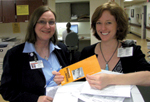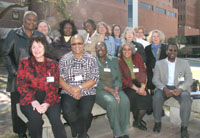by Dawn Brazell
Public Relations
Medical social workers Cinamon Kerr and Peggy Willis regularly meet
people who are lucky to be alive. Working on trauma floors at MUSC,
their typical patients arrive with everything from gunshot wounds to
head trauma from a car accident.
 Medical social workers Cinamon Kerr, right, and Peggy Willis help patients deal with alcohol and/or drug dependence issues. Medical social workers Cinamon Kerr, right, and Peggy Willis help patients deal with alcohol and/or drug dependence issues.
The women help their patients cope with their trauma, but they do more
than that now that MUSC is becoming certified as a Level 1 Trauma
Center through the American College of Surgeons. The certification
means the hospital is implementing screening and prevention programs to
determine if patients who arrive as a Level 1 or 2 trauma are at risk
for having or developing a dependence on alcohol and/or drugs. The
trauma social workers then provide treatment referrals, education and
motivational therapy to the patients who are candidates.
Trained in brief intervention-style therapy, social workers typically
have about 20 minutes to make an impact. Willis said amazingly most
patients agree to the voluntary intervention. The goal for social
workers is to develop a rapport with the patient to be better able to
find if there’s an underlying problem that contributed to them being on
a trauma floor.
“It’s a good thing,” she said of the program. “There’s definitely a
place for it. It could be just the right moment for them—maybe it’s
something they’ve been struggling with for years. It’s like a Kodak
moment—when the light goes on and the person says, ‘I want help. I want
services.’ And you say ‘Wow, I made a difference that day.’”
Kerr said she welcomes the change, too.
“Everyone I see is not an alcoholic,” said Kerr. “Some alcohol use is
safe and some other types can lead to unsafe behavior. We’re not going
in there with an accusatory style. We go in there saying this person is
a victim, whether it is a gunshot wound or an accident. Even if they
are at fault, they’re feeling victimized at this point.”
The new program provides follow up tracking to assist people with
referrals and to find out if they’re getting help. The goal is to
reduce the level of trauma resulting from alcohol and drug use, to
reduce rates for driving under the influence and to cut health care
costs. Kerr said the certification will take MUSC’s reputation as a
quality trauma center from a state to a national level.
Kerr has found that about 50 percent of the trauma cases they see have
underlying factors that led to the patients to be hospitalized. Whether
it is a person who drank too much and drove or a patient who was the
victim of an assault of someone who had been drinking or using drugs,
education and awareness become important tools of empowerment.
That’s why another component involves social workers doing community
outreach through such programs as the High School Injury Prevention
Coalition. The coalition’s goal is to influence and change unsafe
driving behaviors of high school students with an emphasis on drinking
and driving and seatbelt use.
Kerr said many people have no idea what alcohol their body weight and
size can handle. Many are surprised when they tell them what their
blood alcohol level was when they were admitted, and some fail to see
the connection between their level and the resulting trauma. When she
senses it will be effective, she sometimes uses scare tactics to help
patients understand the limits of their bodies so they will be more
receptive to adopting safer behavior patterns.
“We have to help people see it through the eyes of the people who have
gone through it—through the eyes of the mom who lost her child or
through the eyes of the family who lost their house because a family
member was out of work for eight weeks.”
Willis said their approach is never moralistic. They keep the focus on
education and awareness. At first Kerr said she was uncomfortable with
the brief intervention style therapy, but then she realized that she
could make a difference in a short period of time.
“You have 20 minutes to plant a seed and watch it grow,” said Kerr.
The educational piece of their program now has become a passion for
her, and she said she’s thrilled to see the growth in the outreach
portion, which other social workers handle.
“I’m going to love to see what it looks like 10 years from now—what
we’re actually achieving and how we’re able to track it—how it’s not
just a check off for our ACS list. It will be about how we’ve decreased
hospitalizations, decreased accidents and deaths,” she said, holding up
the treatment assessment form they use to identify patients with
potential problems.
Check it out
Want to find out how much alcohol you can handle based on your age and gender? Visit
http://www.alcoholscreening.org/
Other helpful sites: http://counsellingresource.com/quizzes/alcohol-cage/index.html and http://www2.potsdam.edu/hansondj/DrinkTooMuch.html
 MUSC's
social workers serve the Children's Hospital, Hollings Cancer Center,
Institute of Psychiatry and many other facilities throughout the
medical center. March is Social Work Month with the theme, “Social
Workers Inspire Community Action.” MUSC's
social workers serve the Children's Hospital, Hollings Cancer Center,
Institute of Psychiatry and many other facilities throughout the
medical center. March is Social Work Month with the theme, “Social
Workers Inspire Community Action.”
Friday, March 26, 2010
|




